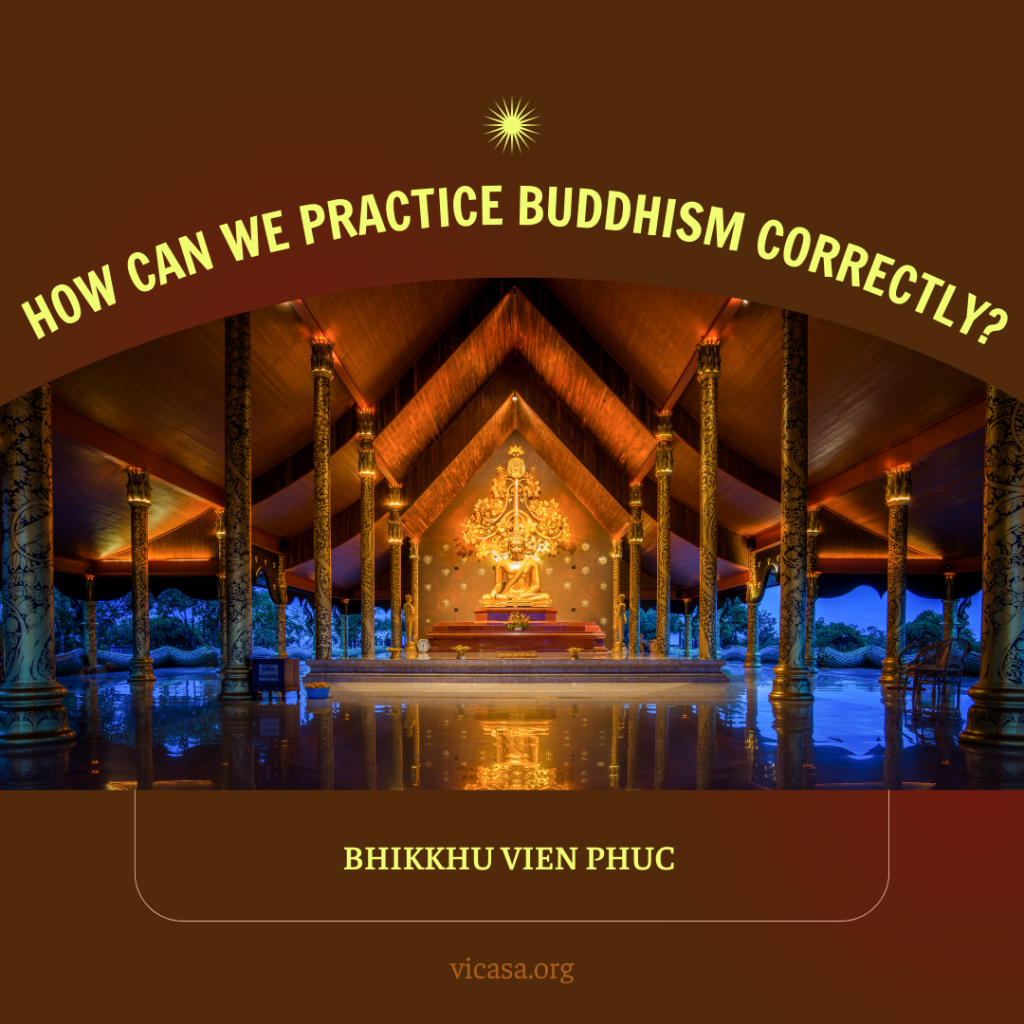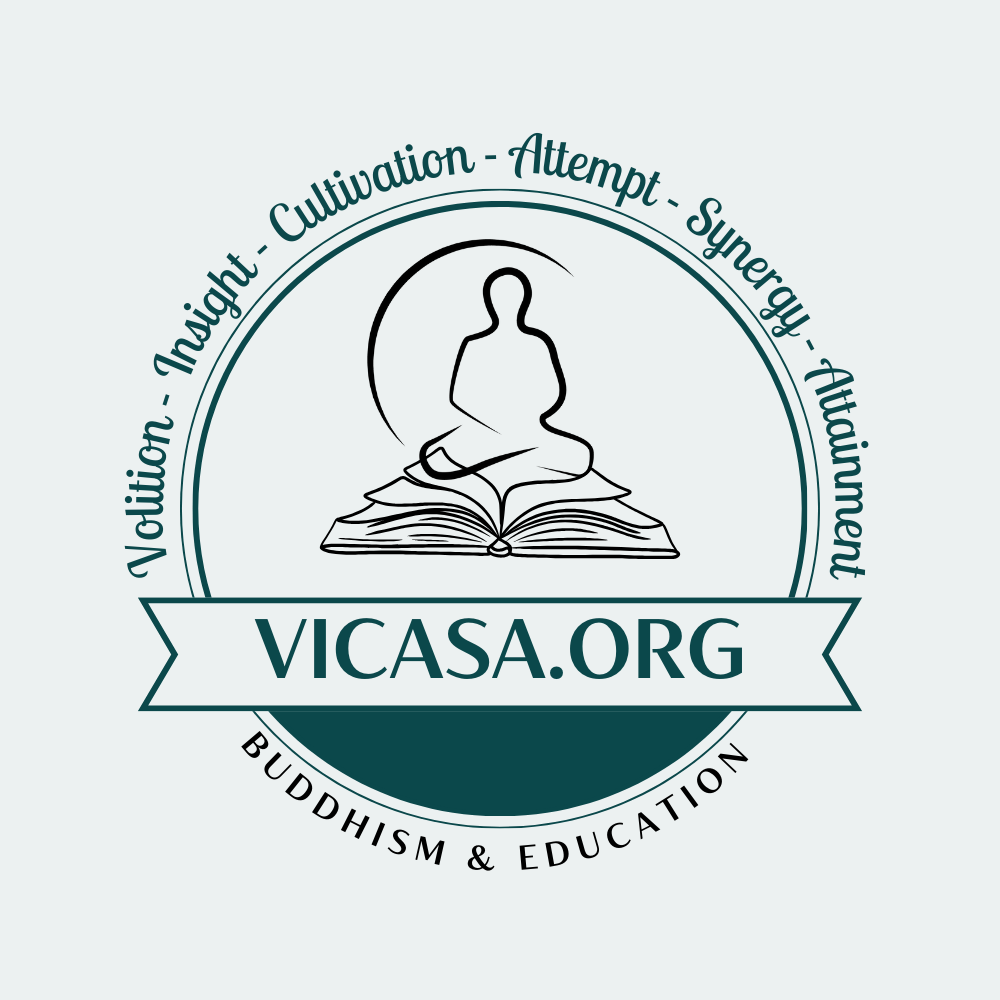- 1. Practicing Buddhism correctly transcends merely 'cultivating oneself to be a human being.' It is not confined to 'striving to live kindly and happily each day' or simplifying it to 'my religion is kindness.'
- 2. Practicing proper Buddhism is not "... following any religion as every religion teaches to do good and avoid evil..."
- 3. Practicing Buddhism is not merely about 'entering the world.'
- 4. Practicing Buddhism is not merely 'learning to handle suffering.'
- 5. Practicing Buddhism correctly goes beyond simply 'correcting oneself.'
- 6. Genuine Buddhist practice surpasses ‘generosity and observing precepts.’
- 7. Practicing Buddhism encompasses far more than the recitation of mantras or attachment to ceremonial observation.
- 8. Practicing Buddhism correctly means not reciting Amitabha all day long, according to Chinese Buddhism, to be saved in the Pure Land heaven.
- 9. Practicing Buddhism correctly is not just about studying or being well-versed in the doctrines, scriptures, writing books, giving lectures, or debating
- 10. Practicing Buddhism correctly is not merely about restraining the six senses, being mindful, and staying alert.

As Buddhists who have taken refuge in the Three Jewels, we adhere to a singular path to practice correctly, in accordance with the true Dhamma realized and taught by the Buddha. This path is the one that leads to the ultimate goals of birthlessness and immortality, signifying the end of rebirth and the suffering of samsara, as well as the attainment of true happiness and freedom—Nibbana. This is achieved by cultivating and practicing the Noble Eightfold Path, also known as the Noble Truth of the Path. This path to the cessation of suffering includes:
• Ethical Conduct (Sīla): Right Speech, Right Action, Right Livelihood
• Mental Discipline (Samādhi): Right Effort, Right Mindfulness, Right Concentration
• Wisdom (Paññā): Right View, Right Intention
According to the Noble Eightfold Path, the path starts with the practice of morality (Sīla) to become virtuous and purified ones, who can eliminate coarse bodily and verbal defilements. This is the initial stage and foundation. Buddhism fails to solely focus on morality, but from the moral basis of ETHICAL CONDUCT, practitioners need to follow the next steps of cultivating the mind: Concentration (Samādhi). This involves mental discipline and meditation practices to develop a purified mind, free from subtle distractions and afflictions, making mind soft, flexible, easy to use, stable, and tranquil. After reaching the concentrated mind, wisdom (Paññā) needs to be practiced to escape from the black night of ignorance and purely eradicate latent roots of greed, hatred and delusion, ultimately leading to detachment from sensuous desires, dispassion, and liberation from suffering.
The Noble Eightfold Path, including Right View, Right Intention, Right Speech, Right Action, Right Livelihood, Right Effort, Right Mindfulness, and Right Concentration, is the due Buddhist way to follow.
1. Practicing Buddhism correctly transcends merely 'cultivating oneself to be a human being.' It is not confined to 'striving to live kindly and happily each day' or simplifying it to 'my religion is kindness.'
This is not Buddhist practice, but this is the practice based on “The Way of being human”, practicing with the purpose of “Living kindly, living happily”, with the purpose of “escaping suffering to find happiness” etc. of pagans. Theravada Buddhism does not stop at becoming a kind, loving, compassionate, joyful, and equanimous person, but surpassingly, targets the ultimate supreme goal of Enlightenment, Liberation, and Ending Suffering in the Wheel of Life and Death, Achieving Genuine Happiness, True Freedom, Nibbana. Do not discuss or argue with disciples of pagans, no matter what title they wear.
2. Practicing proper Buddhism is not "... following any religion as every religion teaches to do good and avoid evil..."
Doing good and avoiding evil are foundational and indispensable principles that everyone should adhere to in order to lead a virtuous life. However, the pursuit of Buddhism extends beyond the practice of such pure ethical precepts. Grounded in moral conduct, one must further engage in the cultivation of Concentration and Wisdom. This comprehensive practice is essential for attaining enlightenment, for the complete and permanent liberation from all forms of suffering and afflictions, and for the cessation of the cycle of birth and death. It leads to the attainment of true happiness, true freedom, and Nibbana. This path, which is unique and supremely valuable, is found solely in Buddhism. The authentic practice involves the cultivation of Morality, Concentration, and Wisdom, as outlined in the Noble Eightfold Path.
3. Practicing Buddhism is not merely about 'entering the world.'
All living beings currently exist in the world, immersed in sensual pleasures, covered by the darkness of ignorance due to greed, anger, and ignorance. Surviving in this World, why must they enter the World? Those who shout the slogan “Buddhism enters the World” are just lowly mortals, corrupted in both normal and religious life, have never reached the taste of liberation beyond this world, and only shout to make excuses and cover up the world. They conceal one’s own dhamma practice against Morality, violating Morality, contrary to the Buddha’s words, the Master who guides the Noble Eightfold Path resulting in the sublime goal of Beyond the World, Nibbana, enlightenment, completely and permanently liberate all suffering and afflictions, end the cycle of birth and death, achieve genuine happiness, true emancipation—Nibbana.
4. Practicing Buddhism is not merely 'learning to handle suffering.'
Contrary to the Truth revealed by the Buddha in the Four Noble Truths, ‘Suffering’ is an immutable truth. It remains constant regardless of whether it is seen or unseen, acknowledged or denied, avoided or confronted. Since it is the Truth, one cannot simply ‘learn to handle’ suffering, nor can one bend or shape it to fit one’s limited and flawed understanding. Instead, one must follow the Noble Eightfold Path to fully comprehend it, to eradicate the roots of suffering—craving and ignorance—through the application of wisdom (Paññā Magga). Attempting to ‘learn to handle suffering’ by ‘transforming suffering’ or seeking to avoid it in pursuit of ephemeral worldly pleasures only perpetuates eternal suffering within the cycle of birth and death. This approach is in direct opposition to the Buddha’s teachings on the practice of ethical conduct, tranquility and wisdom (i.e., the Noble Eightfold Path), which the Exalted One personally realized and imparted to assist deities and humans in achieving enlightenment, the complete liberation from all hardships and discomfort, and the attainment of true happiness and freedom—Nibbana.
5. Practicing Buddhism correctly goes beyond simply 'correcting oneself.'
Ambiguity about the ultimate goal of the holy life according to the path taught by the Buddha, uncertainty about the methods of practicing the Precepts: not clear about what standards to “correct oneself” according to, to achieve what the ultimate goal is, lack of practicing Concentration, lack of practicing Wisdom towards enlightenment, complete and permanent liberation from all suffering and afflictions.
6. Genuine Buddhist practice surpasses ‘generosity and observing precepts.’
This is just cultivating merit and praying for blessings, being absent from the promotion of Concentration and Insight and the direction towards enlightenment and liberation. True practice in Buddhism extends beyond ritualistic activities such as beating drums and reciting suttas. While these may bring temporary peace of mind, it is through the diligent practice of the Precepts, Concentration, and Wisdom that one can achieve enlightenment, fully and permanently liberate oneself from all suffering and afflictions, and attain true happiness and freedom—Nibbana.
7. Practicing Buddhism encompasses far more than the recitation of mantras or attachment to ceremonial observation.
These practices, aimed at attaining supernatural abilities, are not aligned with the core teachings of Buddhism. When the body perishes, and life ceases, such powers also fade away, leading to continued rebirth and enduring suffering within the cycle of birth and death across the six realms and three worlds. This is not the correct path as prescribed by the Noble Eightfold Path, which is designed to lead to the complete and permanent cessation of suffering in samsara, as taught by the Buddha.
8. Practicing Buddhism correctly means not reciting Amitabha all day long, according to Chinese Buddhism, to be saved in the Pure Land heaven.
Rebirth in the blissful heavenly realm is not yet liberation; one still has to die and be reborn, cycling through suffering. These are not the teachings transmitted by the Buddha Gotama (Siddhārtha Gautama). According to Chinese Buddhism, Amitābha is a bodhisattva who aspires to become a Buddha, only appearing in texts written later on, not a historical figure, without Dhamma, without a Sangha, without any trace recorded in the Pali Canon of the original Theravada Buddhism.
9. Practicing Buddhism correctly is not just about studying or being well-versed in the doctrines, scriptures, writing books, giving lectures, or debating
Being well-versed in doctrines and scriptures is merely memorizing the knowledge of others. Without practicing the disciplines of Precepts, Concentration, and Wisdom, it is like knowing a prescription without curing the illness or memorizing a map without reaching the destination.
10. Practicing Buddhism correctly is not merely about restraining the six senses, being mindful, and staying alert.
This is the initial stage of practice. Without nurturing the Precepts and cultivating Concentration, one cannot achieve the Wisdom of Liberation.

Bhikkhu Viên Phúc
English translator: Brenna (Viên Châu)
